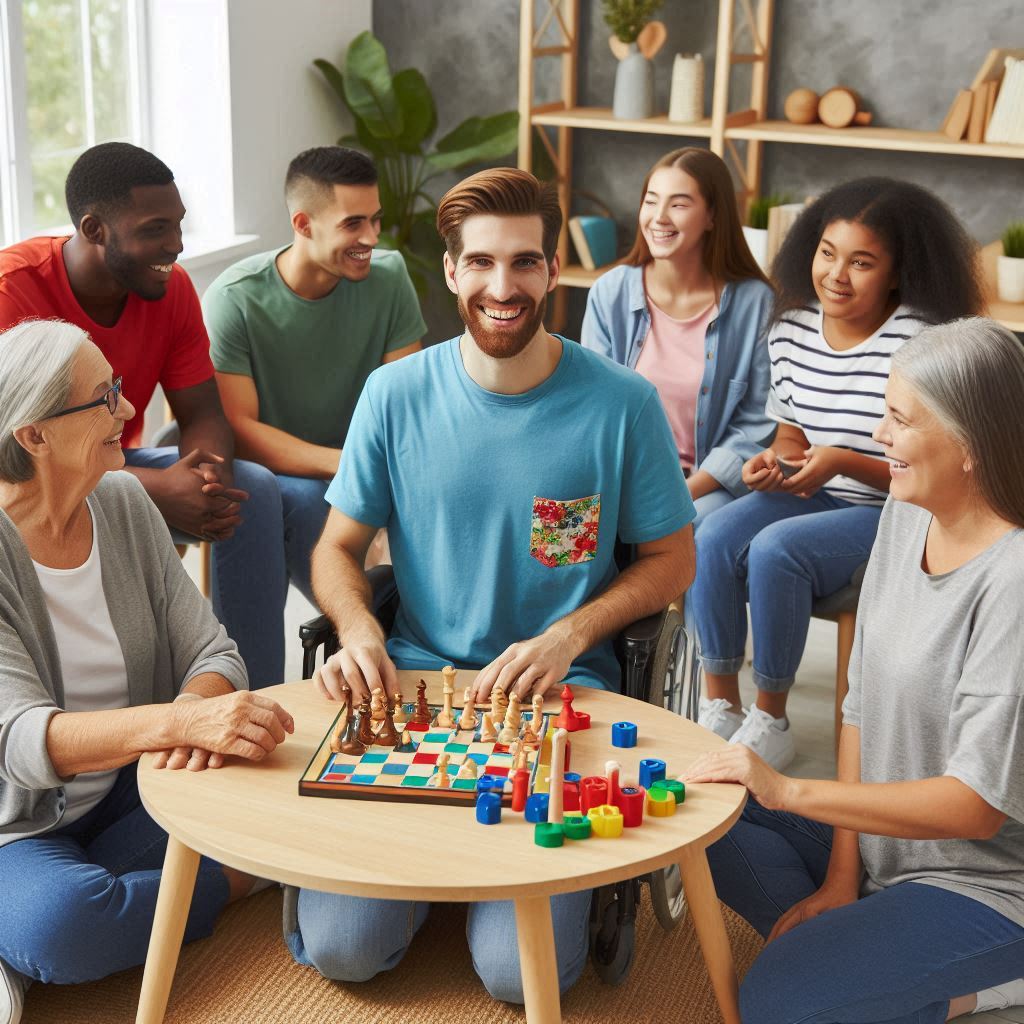Introduction
Recreational therapy and cognitive behavioral therapy are two distinct but complementary therapeutic approaches.
Recreational therapy involves using activities and interventions to improve physical, emotional, and social well-being.
Cognitive behavioral therapy, on the other hand, focuses on changing negative thinking patterns and behaviors to help individuals cope with challenges.
Combining these two therapies can result in a powerful treatment approach that addresses both the physical and mental aspects of an individual’s well-being.
Recreational therapy can provide a fun and engaging way to promote physical health, while cognitive behavioral therapy can help individuals develop healthier thought patterns and coping strategies.
One of the main benefits of combining these two therapies is the holistic approach to treatment.
By addressing both the physical and mental aspects of a person’s well-being, individuals can experience more comprehensive and lasting improvements in their overall quality of life.
This combination can also provide a well-rounded approach to addressing a wide range of mental health conditions and challenges.
Overall, the integration of recreational therapy and cognitive behavioral therapy can provide individuals with a unique and effective way to improve their overall well-being.
By combining physical activities with evidence-based therapeutic interventions, individuals can experience a balanced and comprehensive approach to treatment that addresses both their physical and mental health needs.
What is Recreational Therapy?
Recreational therapy, also known as therapeutic recreation, is a systematic process that utilizes recreation and other activities as interventions to address the needs of individuals with various health conditions or disabilities.
Its primary purpose is to improve or maintain physical, cognitive, social, emotional, and spiritual functioning to enhance overall well-being.
Define Recreational Therapy and Its Purpose
At its core, recreational therapy harnesses the power of activities such as sports, games, arts, and nature experiences to achieve therapeutic goals.
These activities are carefully chosen and adapted to meet the specific needs and abilities of each individual. The therapist works collaboratively with the client to set meaningful goals and integrate them into a structured program.
Different Types of Recreational Activities Involved in Therapy
- Physical Activities: These include sports like swimming, hiking, yoga, and adapted exercises tailored to improve physical strength, coordination, and endurance.
- Creative Arts: Activities such as painting, music therapy, and drama help individuals express emotions, enhance communication skills, and foster creativity.
- Outdoor Recreation: Nature walks, gardening, and camping promote relaxation, reduce stress, and encourage social interaction in natural settings.
- Social Activities: Group games, team-building exercises, and community outings facilitate socialization, improve interpersonal skills, and build confidence.
How Recreational Therapy Can Improve Mental Health
Engaging in recreational therapy offers numerous benefits for mental health:
- Stress Reduction: Participating in enjoyable activities reduces cortisol levels and promotes relaxation, lowering overall stress and anxiety.
- Enhanced Mood: Activities like dancing or playing music release endorphins, boosting mood and combating symptoms of depression.
- Cognitive Stimulation: Games, puzzles, and strategic activities improve cognitive function, memory, and problem-solving skills.
- Emotional Regulation: Art therapy and mindfulness activities teach individuals to manage emotions effectively and cope with challenging situations.
- Social Support: Group activities foster a sense of belonging and encourage meaningful connections with others, reducing feelings of isolation.
- Quality of Life: By promoting physical fitness, independence, and a sense of achievement, recreational therapy enhances overall well-being and quality of life.
In summary, recreational therapy is a valuable therapeutic approach that harnesses the positive impact of leisure activities on mental and physical health.
By incorporating diverse recreational activities tailored to individual needs, therapists empower clients to achieve personal goals, improve functioning, and experience a higher quality of life.
Whether through physical exertion, creative expression, or social engagement, recreational therapy offers a holistic pathway to healing and wellness, promoting resilience and empowerment among participants.
What is Cognitive Behavioral Therapy?
How CBT Focuses on Changing Negative Thought Patterns
- CBT focuses on identifying and challenging negative thought patterns that contribute to emotional distress.
- Therapists work with individuals to recognize these negative thoughts and replace them with more balanced and positive ones.
- Through techniques such as cognitive restructuring and thought diaries, individuals learn to reframe their thoughts in a more helpful and constructive way.
How CBT Can Help Individuals with Various Mental Health Issues
- CBT is highly effective in treating a wide range of mental health issues, including anxiety disorders, depression, phobias, and PTSD.
- By addressing the underlying thought processes that contribute to these conditions, CBT can help individuals develop coping strategies and improve their overall mental well-being.
- Research has shown that CBT is particularly beneficial for individuals who struggle with negative thinking patterns and distorted perceptions of themselves and the world.
Overall, Cognitive Behavioral Therapy is a valuable tool for individuals looking to challenge and change their negative thought patterns in order to improve their mental health and emotional well-being.
Read: Licensing and Certification for Genetic Counselors
Benefits of Combining Recreational Therapy and CBT
Integrating recreational therapy with Cognitive Behavioral Therapy (CBT) offers a multitude of benefits that can significantly enhance therapeutic outcomes.
By combining these approaches, individuals undergoing treatment can experience synergistic effects that address both mental and physical aspects of well-being.
Enhancement of Cognitive Therapy through Physical Activity
Physical activities inherent in recreational therapy provide a dynamic platform for reinforcing cognitive restructuring techniques of CBT.
Activities such as hiking, swimming, or yoga stimulate the body and mind simultaneously. This dual engagement fosters a deeper integration of new thought patterns and behaviors, making the therapeutic process more impactful.
Engagement in Recreational Activities to Improve Mood
Participating in recreational activities has been shown to boost mood and alleviate symptoms of anxiety and depression. Activities like team sports promote social interaction, which is crucial for emotional well-being.
Moreover, the release of endorphins during physical exertion enhances feelings of happiness and relaxation, complementing the cognitive strategies learned in CBT sessions.
Reduction of Stress Levels
Recreational therapy techniques like guided imagery and relaxation exercises can effectively reduce stress levels.
When combined with CBT’s stress management techniques such as mindfulness and cognitive restructuring, individuals learn adaptive coping mechanisms that are reinforced through active participation in recreational pursuits.
This holistic approach empowers individuals to manage stress more effectively in their daily lives.
Promotion of Social Skills and Confidence
Recreational therapy often involves group activities, which provide opportunities to practice and improve social skills.
For individuals struggling with social anxiety or interpersonal difficulties, these settings offer a supportive environment to build confidence and assertiveness.
CBT principles further enhance these experiences by addressing negative thought patterns that may inhibit social interactions.
The mind-body connection is a cornerstone of both recreational therapy and CBT. Engaging in physical activities not only promotes physical health but also strengthens the connection between physical sensations and emotional states.
This awareness enables individuals to identify and manage triggers more effectively, leading to greater emotional resilience and overall well-being.
Personalized Treatment Plans
Combining recreational therapy with CBT allows for tailored treatment plans that cater to individual preferences and needs.
Whether someone enjoys art therapy, nature walks, or dance classes, integrating these activities with structured CBT sessions ensures a comprehensive approach to healing.
Personalized plans increase motivation and adherence to treatment, enhancing long-term outcomes.
Generally, the integration of recreational therapy with Cognitive Behavioral Therapy offers a powerful framework for holistic healing.
By leveraging physical activities to enhance cognitive strategies and mood regulation, individuals can experience profound improvements in mental health and quality of life.
This combined approach not only addresses symptoms but also promotes resilience and personal growth, empowering individuals to lead fulfilling lives.
Whether used in clinical settings or as part of self-care routines, this synergy represents a promising path towards comprehensive mental health treatment.
Read: What to Ask Your Genetic Counselor
Case Studies and Success Stories
Recreational therapy and cognitive behavioral therapy have been successfully combined to help individuals with various mental health challenges. Let’s explore some real-life examples of how this dual therapy approach has made a positive impact.
Transform Your Career Today
Unlock a personalized career strategy that drives real results. Get tailored advice and a roadmap designed just for you.
Start NowCase Study 1: Anxiety Disorder
- John, a 35-year-old man, was struggling with severe anxiety disorder.
- Through a combination of recreational therapy and CBT, he learned coping strategies.
- John participated in outdoor activities such as hiking and yoga to reduce stress.
- With the help of CBT, he challenged negative thought patterns and gradually overcame his fears.
- After several months of dual therapy, John reported a significant decrease in his anxiety symptoms.
Case Study 2: Depression
- Sarah, a 28-year-old woman, was diagnosed with major depressive disorder.
- She started attending group therapy sessions that incorporated recreational activities like art and music.
- CBT helped Sarah reframe her negative beliefs about herself and regain a sense of control.
- By engaging in enjoyable recreational activities, she experienced a boost in mood and motivation.
- After a few months of dual therapy, Sarah’s depression symptoms significantly improved.
These case studies illustrate the effectiveness of combining recreational therapy and CBT in treating mental health issues.
The positive outcomes seen in John and Sarah highlight the holistic approach of addressing both the behavioral and cognitive aspects of their conditions.
By incorporating enjoyable activities and practical skills, individuals can learn to better manage their symptoms and improve their overall well-being.
The tailored approach of dual therapy allows clients to explore different ways of healing and develop a deeper understanding of themselves.
Read: Genetic Counselor vs. Geneticist: Key Differences

Implementing Recreational Therapy and CBT
When it comes to implementing recreational therapy and cognitive behavioral therapy (CBT) together, therapists must approach it with a thoughtful and collaborative mindset.
By incorporating recreational therapy into CBT sessions, therapists can enhance the overall treatment experience and promote holistic healing for their clients.
Here are some tips and guidelines to help therapists effectively integrate recreational therapy into their practice:
Understand the Benefits of Recreational Therapy
- Recognize the value of recreational therapy in promoting physical, mental, and emotional well-being.
- Understand how recreational activities can help clients build confidence, develop social skills, and improve cognitive abilities.
- Appreciate the role of leisure activities in reducing stress, anxiety, and depression.
Incorporating Recreational Therapy into CBT Sessions
- Identify specific recreational activities that align with the goals of CBT treatment.
- Integrate these activities into therapy sessions to provide a well-rounded approach to healing.
- Incorporate mindfulness and relaxation techniques into recreational activities to enhance their therapeutic benefits.
Creating Customized Treatment Plans
- Assess each client’s unique needs, interests, and abilities to tailor the treatment plan accordingly.
- Collaborate with recreational professionals to develop personalized activities that support the client’s therapy goals.
- Regularly evaluate and adjust the treatment plan based on the client’s progress and feedback.
Importance of Collaboration
- Recognize the complementary nature of recreational therapy and CBT in promoting overall well-being.
- Work closely with recreational professionals to ensure continuity and alignment in treatment goals.
- Communicate effectively with other therapists and professionals involved in the client’s care to provide a cohesive treatment approach.
By following these tips and guidelines, therapists can effectively incorporate recreational therapy into CBT sessions and create customized treatment plans that meet the unique needs of their clients.
Collaboration between therapists and recreational professionals is key to promoting holistic healing and maximizing the benefits of both therapies.
Read: Benefits of Genetic Counseling for Families
Challenges and Considerations
In the integration of recreational therapy and cognitive behavioral therapy (CBT), several challenges may arise. Understanding these obstacles is crucial to effectively implementing this combined approach.
Potential Challenges
Engaging clients in recreational activities while maintaining focus on therapeutic goals can be demanding. Balancing structured therapy with the spontaneity of recreational activities requires careful planning.
Ensuring that activities chosen are suitable for therapeutic interventions is essential. Matching the recreational component with the cognitive goals of CBT can pose initial difficulties.
Overcoming Challenges
To overcome these challenges, therapists can tailor activities to align with CBT objectives. Adapting games and exercises to reinforce cognitive restructuring can enhance therapeutic efficacy.
Regular communication between recreational and CBT therapists facilitates cohesive treatment plans. Collaboration ensures activities support and complement cognitive interventions.
Individualizing therapy plans based on client needs promotes engagement and effectiveness. Personalized approaches acknowledge varying preferences and therapeutic requirements.
Adapting to Individual Needs
Flexibility in session structures allows for adjustments based on client responses and progress. Modifying activities in real-time enhances therapy’s responsiveness to immediate therapeutic needs.
Incorporating client feedback and preferences into activity planning fosters a sense of empowerment. Empowering clients enhances motivation and commitment to the therapeutic process.
Addressing physical and cognitive limitations with adaptive equipment ensures inclusivity and accessibility. Accessibility measures support participation and engagement across diverse client profiles.
Monitoring Progress
Regular assessment of cognitive and behavioral changes provides insights into therapy effectiveness. Tracking progress guides adjustments in therapy strategies and activity selection.
Objective measurements, such as mood scales or behavioral checklists, quantify therapeutic outcomes. Quantifying outcomes supports evidence-based decision-making in therapy adjustments.
Making Adjustments
Flexibility in therapeutic approaches allows for timely modifications in response to client needs. Adjusting goals and methods maintains relevance and effectiveness throughout therapy sessions.
Consulting with clients about their experiences and perceived benefits encourages active involvement. Client involvement promotes ownership of therapeutic outcomes and enhances treatment motivation.
Importance of Monitoring and Adjustment
Consistent monitoring and adaptation ensure therapy remains dynamic and responsive. Dynamic therapy fosters continuous improvement and client satisfaction with treatment outcomes.
Transform Your Career Today
Unlock a personalized career strategy that drives real results. Get tailored advice and a roadmap designed just for you.
Start NowIn , combining recreational therapy with CBT presents challenges that can be overcome through strategic planning and adaptability.
Navigating these challenges involves aligning therapeutic goals, individualizing approaches, and monitoring progress closely.
By addressing obstacles proactively, therapists enhance the therapeutic experience and promote meaningful outcomes for their clients.
Conclusion
In this section, we’ve explored the powerful synergy between recreational therapy (RT) and cognitive behavioral therapy (CBT).
Both therapies offer distinct yet complementary benefits for individuals striving to improve their mental health and overall well-being.
Key Points Explored
Recapitulating, RT utilizes leisure activities to foster emotional and physical healing. It promotes relaxation, reduces stress, and enhances social interaction.
CBT, on the other hand, focuses on identifying and changing negative thought patterns and behaviors. It equips individuals with effective coping strategies and promotes lasting psychological resilience.
The Synergistic Benefits
When combined, RT and CBT create a holistic therapeutic approach. RT provides a platform for experiential learning and emotional expression, complementing CBT’s cognitive restructuring techniques.
This combination enriches therapeutic outcomes by addressing the mind-body connection comprehensively.
It empowers individuals to confront challenges actively while fostering a positive mindset through enjoyable activities.
Encouraging Integration for Improved Mental Health
For those considering therapy, integrating RT and CBT offers a dynamic path towards enhanced mental health. This approach not only targets symptoms but also cultivates long-term coping skills and emotional resilience.
Engaging in recreational activities under therapeutic guidance encourages exploration of personal strengths and interests. This exploration aids in rebuilding self-esteem and fostering a sense of accomplishment.
Personal Reflection and Action
Reflecting on your own mental health journey, consider how RT and CBT could synergize to meet your needs. Embrace the opportunity to explore new activities that resonate with your interests and values.
By actively participating in RT sessions integrated with CBT principles, individuals embark on a transformative process. They learn to manage stressors more effectively and develop healthier thought patterns.
Moving Forward: Choosing Comprehensive Well-being
All in all, the integration of recreational therapy and cognitive behavioral therapy represents a forward-looking approach to mental health care.
It emphasizes proactive engagement in therapeutic activities that promote well-being on multiple levels.
Choosing this integrated approach signifies a commitment to personal growth and resilience. It empowers individuals to embrace life’s challenges with confidence and to nurture a balanced and fulfilling lifestyle.
Embrace the Journey
As you navigate your mental health journey, remember that seeking support is a sign of strength. The combination of RT and CBT offers a structured yet flexible framework for achieving profound and sustainable change.
By incorporating these therapeutic modalities, individuals not only enhance their mental health but also rediscover joy in everyday activities.
Embrace the journey towards improved well-being—start today for a healthier tomorrow.
Final Thoughts
Incorporating recreational therapy alongside cognitive behavioral therapy fosters a holistic approach to mental health.
It encourages exploration, growth, and resilience-building through enjoyable and meaningful activities. Consider this integrated approach as you prioritize your mental health and well-being journey.
[E-Books for Sale]
The Big Book of 500 High-Paying Jobs in America: Unlock Your Earning Potential
$19.99 • 500 High-Paying Jobs • 330 pages
Explore 500 high-paying jobs in America and learn how to boost your career, earn more, and achieve success!
See All 500 High-Paying Jobs of this E-Book
1001 Professions Without a Degree: High-Paying American Jobs You Can Start Now
$19.99 • 1001 Professions Without a Degree • 174 pages
Discover 1001 high-paying jobs without a degree! Unlock career tips, skills, and success strategies for just $19.99!




